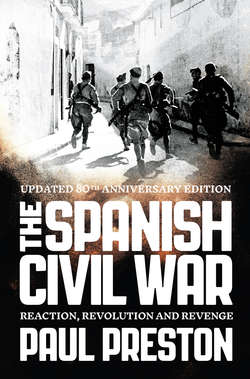Читать книгу The Spanish Civil War: Reaction, Revolution and Revenge - Paul Preston - Страница 7
Preface
ОглавлениеI wrote the first version of this book thirty years ago. My intention then was to provide the new reader with a manageable guide to the bibliographical labyrinth constituted by the fact that the Spanish Civil War has continued to be fought on paper. Even then there had been several thousand books on the Spanish Civil War and many of them were extremely long. Because the flow did not stop, I rewrote the book in 1996 in order to take account of what had been published in the ten years following its first appearance. At that point, I could not have imagined how much more was still to come. Accordingly, in 2006 I wrote a much expanded version in an attempt to come to terms with the very considerable body of scholarship which has been published in Spanish, Catalan, English and other European languages since 1996. It also drew on my own ongoing research on Franco, the Francoist repression and Mussolini’s role in the Spanish Civil War. Over the following years, the flood has not abated, and in this new edition I take account of the most important advances in knowledge about the war as well as drawing on my recent research on the role of Franco, on the murders of civilians behind the lines on both sides, on anti-clerical persecution, on the bombing of Guernica, and on way in which the war ended.
Inevitably, the 2006 edition of the book was much longer – the text 50 per cent longer – than in 1996, and this one adds further material in the light of recent research. Like the three earlier versions, it is interpretative rather than descriptive although even more ample use has been made of contemporary quotation to give a flavour of the period. It remains a book that does not set out to find a perfect balance between both sides. I lived for several years under Franco’s dictatorship. It was impossible not to be aware of the repression of workers and students, the censorship and the prisons. As late as 1975 political prisoners were still being executed. Despite what Franco supporters claim, I do not believe that Spain derived any benefit from the military rising of 1936 and the Nationalist victory of 1939. Many years devoted to the study of Spain of before, during and after the 1930s have convinced me that, while many mistakes were made, the Spanish Republic was an attempt to provide a better way of life for the humbler members of a repressive society. Against such temerity, the revenge taken by Franco and his followers was brutal and pitiless. Accordingly, there is little sympathy here for the Spanish right, but I hope there is some understanding.
My early interest in Spain was stimulated by the postgraduate seminar run at the University of Reading by Hugh Thomas and by Joaquín Romero Maura in Oxford. Over many years, I learned an enormous amount during my friendship with Herbert Southworth who was always prodigal with his hospitality and his knowledge. When I wrote the 1996 version, I was aware of how much I had derived from conversations over many years with Raymond Carr, Norman Cooper, Denis Smyth, Angel Viñas, Julián Casanova, Jerónimo Gonzalo and Martin Blinkhorn. Throughout the 1990s, the historiography of the Spanish Civil War was profoundly changed by the research of Ángela Cenarro, Helen Graham, Gerald Howson, Enrique Moradiellos, Alberto Reig Tapia, Francisco Espinosa Maestre and Ismael Saz. I continue to gain greatly from reading their work and many hours of conversation with them.
My friends Paul Heywood and Sheelagh Ellwood gave me marvellous support during the writing of the first edition. Their role in the second version was assumed by Helen Graham, supplemented by constant interchanges of ideas and information with Hilari Raguer and Francisco Espinosa Maestre. I was also grateful to Francisco Moreno Gómez, Isabelo Herreros and Luis Miguel Sánchez Tostado for help with particular issues. Over subsequent years, I have benefited further from my ongoing interchanges with Linda Palfreeman, Boris Volodarsky, Carmen Negrín, Ángel Viñas, Francisco Espinosa Maestre, Fernando Hernández Sánchez, Javier Cervera Gil, Enrique Líster López, Aurelio Martín Nájera of the Fundación Pablo Iglesias and Sergio Millares of the Fundación Juan Negrín.
My wife Gabrielle is, as ever, my shrewdest critic. With such a team of friends to help, it seems astonishing that any book could still have shortcomings. Unfortunately it does and they are mine.
